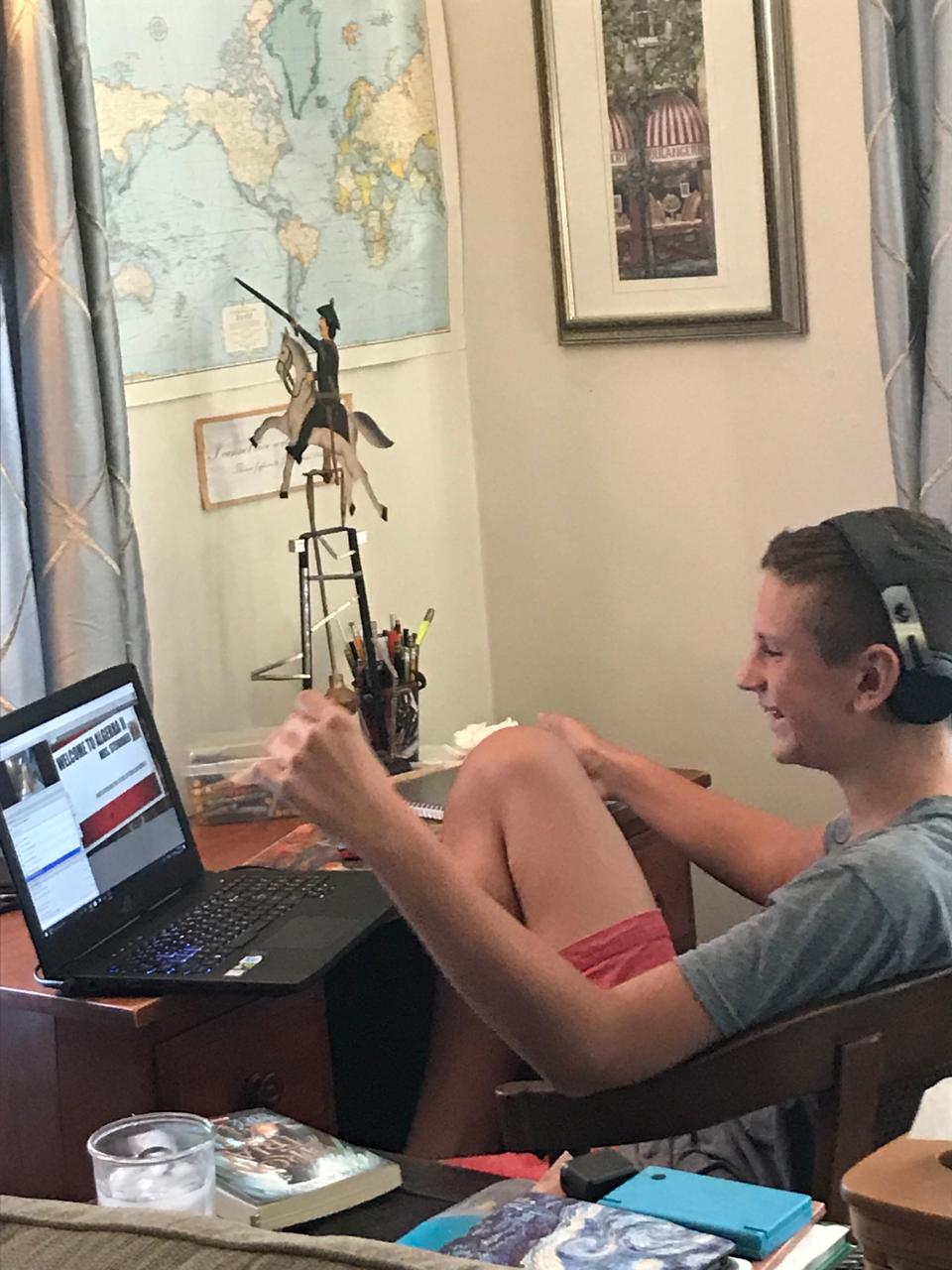York County schools could net extra $22 million a year if Pa. education advocates prevail
In Erie County, a superintendent says a handful of relatively straightforward state reforms could free up enough money for his school district to make security upgrades and invest in more mental health services.
Across the commonwealth, Montgomery County education leaders predict the same changes could help them pay to install air conditioning units in their middle schools. And in Beaver County, projected savings from the proposal could help stave off future tax increases for residents, another superintendent says.
These public school leaders are talking about reforming Pennsylvania's cyber charter funding structure, a decades-old system that many districts agree is broken and a growing budgetary albatross.
“The way we fund cyber charter schools now just defies all logic,” said Matt Lane, superintendent for Erie County’s General McLane School District. In a guest column in the Erie Times-News, Lane decried the “crippling impact” that the existing funding mechanism has on district finances.
Now, after many years of stagnation on the issue, public school advocates — who have ranked this issue as one of their priorities for the Pennsylvania General Assembly — say state leaders finally seem on the verge of action.
A proposal for simplifying charter tuition payments and easing the burden on public school districts cleared the House in 2023 by a bipartisan vote and now awaits a hearing in the Senate. The cause got another significant boost in February when Gov. Josh Shapiro said charter funding reform was on his agenda for the coming year.
But charter advocates are pushing back, arguing the real motive behind the proposed reforms is to undermine school choice and drive these virtual academies out of the commonwealth. Families are turning to charters as a refuge from traditional public schools, the advocates argue, and education officials should address these underlying issues rather than try to cut off the exits.
They say the effort is more about money than what’s best for students.
The bill progressing through the General Assembly would save Pennsylvania school districts nearly $456 million each year by lowering the amount they pass along to cyber charters, according to legislative estimates. That would include more than $22 million for York County districts alone.
Shapiro’s plan wouldn’t incorporate all the changes suggested by the legislation but would still yield an estimated $262 million in savings for districts across the commonwealth.
Though these conversations are not new — and even former Gov. Tom Wolf took an unsuccessful stab at changing the cyber charter funding system — past negotiations have fallen apart amid stark differences between the factions involved.
But this time feels a bit different to reform proponents, who see the bill’s progress through the Pennsylvania House as a promising sign that lawmakers are finally willing to confront this issue.
Supporters of these changes say Senate Republicans are holding things up, with the legislation lingering for months in the chamber without getting a hearing.
Elizabeth Stelle, director of policy analysis at the Commonwealth Foundation, says the current debate centers on a faulty premise and that the conversation should be about standardizing student funding for all schools, not just charters.
Charter schools already receive less money per student than traditional schools, she pointed out, although public education advocates contend this makes sense because districts provide transportation to regular and charter students and offer other services that charters do not. Stelle, though, sees that disparity as unfair.
“What we’re implicitly saying is that that student is somehow worth less,” Stelle said, “which I don’t think is the message that we want our families and our parents to get.”
More: One York County district has been designated as a Great Pennsylvania School
Why do Pa. school officials have a problem with cyber charter funding?
School districts peg charter school payments as one of their foremost financial challenges, with more than three-quarters of survey respondents identifying these tuition rates as a leading cause of budget pressure, according to a recent poll of Pennsylvania district administrators.
The amounts districts pay to Pennsylvania’s 14 cyber charters have attracted particular scrutiny, in part because these online academies attract students from all over the commonwealth but get vastly different funding rates for them depending on where they’re from. Because of the current district-by-district method for calculating these payments, two kids attending the exact same cyber charter might draw $8,500 in tuition or $22,000 in tuition simply based on where they live.
In addition, public school advocates argue the rates ignore the cost savings of virtual instruction, which requires less spending on buildings and utilities. Districts now pay the same per-student tuition to brick-and-mortar charter schools as they do to cyber charters.
“Describing this, intuitively, anyone would reach the same conclusion, I think: Why would a cyber school get paid the same as a brick-and-mortar school when they don’t have the same expenses?” said Steve Skrocki, chief financial officer for the North Penn School District in Montgomery County.
Many public school officials also object to the tuition bills they’re footing for special education students who attend charters.
The state offers public schools different levels of special education funding depending on how many additional services and accommodations a particular student requires. Charter schools, though, get the same special education tuition rate regardless of whether a student is extremely high-need or is enrolled in a small amount of speech therapy, said Andy Christ, senior director of education policy for the Pennsylvania School Boards Association.
Moreover, the cost savings from the departure of a single student into a charter generally isn’t large enough to offset the district’s payment to these academies, Christ said. So education officials are often forced to compensate in other ways, whether it’s by increasing local property taxes or cutting programs and services to children who remain in traditional public schools.
Among public education officials, there’s almost universal agreement that the state should change the charter funding system, according to Christ, who said roughly 94% of the Keystone State’s school boards have adopted a resolution urging the General Assembly to enact reforms.
Though Christ said the school boards association has been aware of these problems since the cyber charter law was passed in the early 2000s, the pandemic put them in sharper relief with skyrocketing demand for online learning. During just one year of the COVID-19 crisis, districts’ tuition payments to cyber charters soared by $335 million, or nearly 50%, according to the groups Research for Action and Pennsylvania Clearinghouse for Education Research.
Adding insult to injury, local school districts have watched some cyber charters amass large budget surpluses and funnel money toward marketing campaigns — sometimes sponsoring firework displays or parade floats as a way to advertise.
Stelle defended some level of marketing, saying local communities aren’t naturally aware of cyber charters the way they are of public schools in their area. And some school districts also have sizable fund reserves, she noted, although she believes there’s room for conversation about how charter advertising should work and how large budget surpluses should be.
She contends that cyber charters and other alternative schooling options benefit everyone, including families who opt to stick with traditional public education.
“Having charters of different kinds creates accountability and it creates competition,” Stelle said, “which is going to improve student performance across the board.”

What cyber charter changes are under consideration in Pa.?
In light of their grievances, public school officials and advocates are demanding more accountability for cyber charters and a standardized tuition rate that could save districts hundreds of millions each year.
A bill sponsored by Rep. Joe Ciresi, D-Montgomery, would establish a statewide cyber charter tuition of $8,000 per student.
The legislation, HB1422, would also create tiered tuition rates for special education students based on their level of need and add transparency requirements. It would bar cyber charters from sponsoring parades, professional sports games and similar events and require them to state in their marketing materials that taxpayer dollars cover the cost of student tuition.
As beneficiaries of public tax funding, charters “shouldn't be held accountable any more than we are,” Lane said. “But it certainly should not be less, either.”
The House of Representatives approved the bill in a bipartisan vote last year, but the legislation hasn’t advanced since it crossed into the GOP-controlled Senate.
Still, in Christ’s estimation, it’s the first serious cyber charter reform legislation to make real headway in the Pennsylvania General Assembly.
More: Students at Central York join statewide battle against 'extremist' takeovers at schools
Christ said district officials have talked about investing charter reform savings in instructional programs and in technology or curriculum modernization. Local taxpayers also might benefit, as the financial cushion could help school districts prevent future rate hikes, he said.
Charter school advocates, on the other hand, say the proposed changes would devastate them financially — and accuse reform proponents of aiming to do just that.
“Make no mistake, regardless of what they say, anti-cyber charter school advocates want cyber charters gone and their actions prove it,” Timothy Eller, senior vice president of outreach and government relations for Commonwealth Charter Academy, wrote in a recent letter to the editor.
Education officials are attacking the concept of school choice rather than fixing the problems that have parents dissatisfied with public schools in the first place, Eller continued.
And with charter school attendees already receiving less funding than public school students, Stelle said the changes proposed by Ciresi would only deepen existing inequalities “without a clear justification for why that disparity needs to exist.”
Lane acknowledged that cyber charters are the right option for some families and said he's not on a mission to shut these schools down but to correct what he believes is a broken process.

Where does the debate currently stand?
The conversation about cyber charter reform got an additional push in February when Shapiro listed it as an administration priority.
In his budget address, Shapiro called for developing a cyber charter reimbursement rate that “actually reflects what it costs to send a kid” to these institutions, offering as an example the $8,000-per-pupil figure recommended by HB1422.
“If we do that, we will level the playing field,” he said.
Shapiro’s plan, which would call for the standardized tuition rate but doesn’t include all aspects of Ciresi’s bill, would still save about a quarter-billion-dollars for school districts statewide.
Sen. David Argall, who chairs the education committee considering HB1422, agrees that virtual learning is less costly than in-person instruction and that cyber charter tuition rates should reflect these savings. But he’s not sure the number suggested by Shapiro is the right one — and said charter school supporters are wary of purported reform attempts that would threaten their continued existence.
“There are people that want to put the cyber charters out of business, and there are a lot of advocates of school choice in the General Assembly,” Argall said. “So some of those gaps, we're never going to bridge.”
Still, Argall said he does expect lawmakers will do something to update the commonwealth’s cyber charter system, even if it’s not everything public school advocates and Democrats would want.

“Even if we only agree on 5% or 10%, getting that piece done would be much more than what's been done in the last 10 or 15 years,” the Schuylkill County Republican said.
Argall said he anticipates a forthcoming version of the bill that will strive to find common ground. After that, he said, it’ll be up to state lawmakers to make sure the consensus language finds safe passage to Shapiro’s desk.
“Anyone can amend it along the way, and if they do, that’s likely to kill it,” the senator said. “So, it’s going to be a very, very delicate process.”
This article originally appeared on Beaver County Times: How much could York PA schools save under state cyber charter reform?

